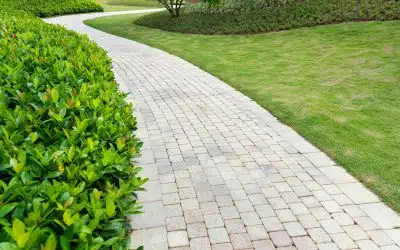Understanding Pavers
AESTHETIC IMPORTANCE
Pavers play a big role in the look of your outdoor space. They enhance curb appeal. This means they make your home look more attractive from the street. A well-designed paver driveway or patio can also increase your property’s value. It’s not just about looks, though. The style of pavers you choose reflects your personal taste.
Choosing the right pavers can transform an ordinary outdoor area into a stunning one. Imagine walking up to a house with vibrant, neatly arranged pavers versus plain concrete. The difference is night and day.
STRUCTURAL INTEGRITY
The structure beneath those beautiful pavers matters too. Proper installation prevents them from shifting and sinking over time. This is crucial for areas that handle a lot of foot traffic or heavy items like cars.
Good foundation work supports even weight distribution across the surface. This extends the lifespan of your pavers, keeping them looking good as new for years to come.
MAINTENANCE BENEFITS
Regular maintenance has its perks beyond just aesthetics.
- Reduces long-term repair costs.
- Keeps pavers functional.
- Preserves their original appearance.
By taking care of your pavers, you’re investing in their longevity and functionality. Simple actions like removing weeds or sealing gaps can prevent major issues down the line.
Keeping up with maintenance ensures that your outdoor space remains inviting and usable year-round.
Cleaning Techniques
BROOM CLEANING
Broom cleaning is your first line of defense to keep pavers looking beautiful. It’s simple. Just grab a broom and sweep away the loose dirt and debris. This method prevents surface scratching that can make pavers look worn over time. Make it a habit, and you’ll find it’s a quick way to maintain your pavers’ appearance.
Regular upkeep with a broom also helps in spotting any issues early on, such as moss or weed growth between the stones. Catching these problems early means easier maintenance down the line.
RINSING MAINTENANCE
Next up is rinsing maintenance. This involves using water to wash away accumulated grime that sweeping alone can’t remove. It restores the natural color of your pavers without using harsh chemicals, making it an excellent option for those concerned about environmental impact.
A gentle hose down every now and then keeps things looking fresh and avoids buildup that could lead to staining or damage over time.
CLEANING SOLUTIONS
Natural Options
For those preferring eco-friendly methods, natural cleaning solutions are ideal. Mixing vinegar or baking soda with water creates effective cleaning agents safe for both your pavers and surrounding plants.
These options not only clean but also help prevent weed growth when applied regularly—just be sure to rinse thoroughly after application to avoid leaving any residue behind.
Chemical Solutions
When facing tough stains or persistent moss, chemical solutions might be necessary. These products are specifically designed for this purpose but require careful handling.
- Always follow manufacturer’s instructions.
- Wear protective gear if recommended.
- Test on a small area before full application.
Sealing for Longevity
SEALANT OPTIONS
Applying a sealant is key to keeping your pavers beautiful. It protects against staining and fading. Your pavers will also have their color vibrancy enhanced. But, remember, sealants need reapplication over time.
Different types of sealants offer various levels of protection and aesthetics. Some make colors pop more, while others focus on preventing wear and tear. Choose what fits your needs best.
PROPER USE
Using your pavers correctly plays a big role in their longevity. Avoid damage by keeping heavy machinery off them. This ensures even wear and tear.
Proper use also means maintaining alignment and spacing between the pavers. It keeps them looking organized and prevents uneven surfaces that can cause accidents.
PRESERVING AESTHETICS
After sealing, stick to a regular cleaning schedule as discussed in “Cleaning Techniques”. Immediate treatment of stains keeps them from setting in deep.
Seasonal inspections help catch issues early on before they become bigger problems down the line.
- Look for loose or shifting pavers.
- Check for signs of erosion around the edges.
Weed and Stain Management
WEED REMOVAL
Polymeric sand is your ally in keeping pavers beautiful. When applied to paver joints, it not only stabilizes them but also deters weed growth and pests. It’s effective because it resists erosion from water, a common issue that leads to unsightly weeds.
Besides using polymeric sand, consider natural control methods. Encourage beneficial insects by planting specific flowers or herbs around your pavers. They help keep the pest population in check. Ground cover plants between pavers can also prevent weeds by occupying space where weeds might grow. Promoting good drainage will stop moss from taking hold.
STAIN TECHNIQUES
Firstly, identify the type of stain on your pavers for proper treatment. Different stains require different approaches.
Before applying any cleaning solution, always test it on a small area first. This ensures you won’t accidentally damage or discolor your entire patio or walkway.
For most stains, use a soft brush to avoid surface damage during cleaning. Harsh scrubbing can wear down the protective sealant you applied earlier for longevity.
Seasonal and Regular Maintenance
SEASONAL CLEANING
Seasonal cleaning is crucial for keeping your pavers looking beautiful. Each season brings its own challenges. For example, fall leaves can stain pavers if left unattended, while winter salt can cause damage over time.
To prepare your pavers for extreme weather, adjust the frequency of maintenance as needed. After dealing with weeds and stains, this step ensures that seasonal elements don’t undo your hard work.
JOINT MAINTENANCE
Regular checks are key to maintaining the joints between pavers. Look out for sand loss or weed growth. These issues can compromise the stability and look of your paving.
Reapplying polymeric sand when necessary helps keep joints stable and aesthetically pleasing. This task complements weed and stain management by ensuring the foundation of your pavement remains intact.
MAINTENANCE SCHEDULE
Creating a maintenance schedule is essential. Plan weekly, monthly, and annual tasks to include both cleaning and inspection activities.
Your schedule should adapt based on weather conditions and how often you use the area. Here’s an example:
- Weekly: Sweep off debris.
- Monthly: Inspect joints for sand loss.
- Annually: Perform a deep clean with appropriate cleaners.
Repair and Replacement
CHIPPED PAVERS
Chipped pavers can be an eyesore in your beautiful pathway or patio. It’s important to identify why they chipped. This way, you prevent it from happening again. Sometimes, flipping the paver is a smart fix if the underside is undamaged. This maintains a uniform surface level across your path.
If flipping isn’t an option, consider replacing the chipped piece. Matching the new paver with surrounding ones keeps everything looking seamless.
BROKEN PAVERS
Broken pavers pose not just an aesthetic issue but a safety hazard too. You should replace them immediately to keep everyone safe around your home. Finding a match for the new paver might take some effort but it’s crucial for maintaining consistency in appearance.
During replacement, don’t forget to check the underlayment condition too. A good base ensures longevity for all your pavers.
GROUT REPAIR
Over time, grout between your pavers may crack or wear away. Start by cleaning out any old or damaged grout thoroughly before applying new material. Choose a grout color that matches existing ones for visual consistency across your paved area. Apply new grout carefully to avoid overflow which can mar the look of adjacent stones.
Avoiding Damage
DEICING CHEMICALS
After ensuring your pavers are well-repaired and replaced, the next step is to prevent further damage. One common winter problem is the use of deicing chemicals. These can be harsh on concrete pavers. To keep your pavers looking beautiful, choose products that are safe for concrete surfaces.
Apply these products sparingly. Too much can harm your pavers over time. After the ice melts, rinse off any residue when weather permits. This helps minimize long-term damage.
PREVENTING GAPS
Proper installation is key to avoiding gaps between your pavers. Make sure they’re installed correctly from the start.
Over time, monitor the edge restraints around your paver area for any movement or shifting. If you notice gaps forming, fill them promptly with an appropriate material like sand or a specialized joint filler designed for this purpose.
Keeping an eye on these areas and addressing issues quickly will help maintain the beauty and integrity of your paving stones.
Professional Assistance
FINDING CONTRACTORS
To keep your pavers looking beautiful, finding the right help is crucial. Start by asking friends or family for recommendations. They might know someone reliable. Next, check if the contractor has experience with pavers specifically. This ensures they understand your needs.
Look at their previous work too. A good portfolio can give you confidence in their skills.
ESTIMATING COSTS
Understanding costs is important too. The size of the area, material choice, and labor will all affect price. Don’t forget about extra expenses like repairs or sealant application.
It’s wise to get quotes from several contractors to compare prices.
Final Remarks
Keeping your pavers shining like the top of the Chrysler building isn’t rocket science—it’s all about sticking to the basics we’ve covered: cleaning, sealing, managing those pesky weeds and stains, and keeping up with maintenance. It’s like brushing your teeth; regular care avoids bigger headaches down the road. Whether it’s battling the elements or just normal wear and tear, remember that a stitch in time saves nine. Your pavers are the red carpet to your home, so keeping them pristine is key to making a grand entrance every day.
Now, don’t just stand there like a statue! Grab that broom, those sealants, and maybe even get on the horn to call in the pros if you’re feeling overwhelmed. Your pavers won’t shine themselves, but with a little elbow grease and some TLC, they’ll be turning heads for years to come. Let’s make those pavers pop!




